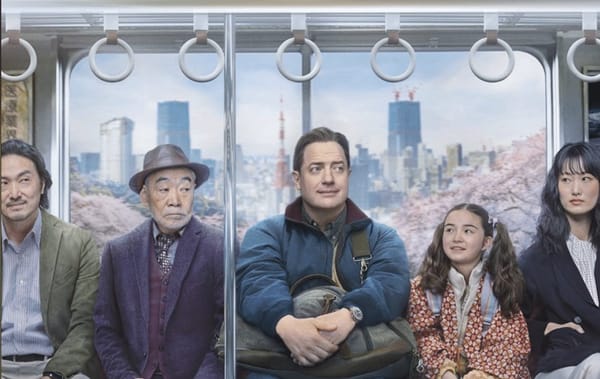★★½ (2½ out of 4)
I’m allergic to feel good clichés. That’s on me and it’s probably why my first impression of “Rental Family,” starring Brendan Fraser as an American actor adrift in Tokyo, is that there’s something off about this movie—Fraser’s first starring role since winning an Oscar for “The Whale”— something pandering that doesn’t connect to authentic emotions. I was wrong. It takes looking deeper to understand what this movie is about. Wait, I’m jumping too far ahead.
Let’s start at the beginning: In Japan, the concept of a rental family, which started in the 1990s, refers to an actual service where clients hire actors to play the roles of family members or friends for social events or companionship. The film ties into Japanese culture with its concern for appearances, the perception of others and the frequent need to save face. This is a real industry in Japan, as documented in The New Yorker and the Werner Herzog film “Family Romance LLC.”
There’s something off about this movie, something that doesn’t connect. That is until you look deeper and understand what it’s really about.
One American who knows zilch about rental families is Phillip Vandarpleog, the out-of-work actor in Tokyo played by Fraser. Aside from a toothpaste commercial as a warrior against gingivitis, Phillip is hardly in demand after seven years in Japan. His agent pushes him to take an offer from the “rental family” agency. It pays well and all Phillip has to do is play “a sad American.” No problem there since Phillip, frequently shot in his shoebox apartment set against the crowded streets of Tokyo, is loneliness incarnate.
Phillip’s rental debut is as a mourner at a wake for a man who isn’t dead but wants to see the reactions of his nearest and dearest. Weird, yes, but easy-peasy. That’s when Shinji, the agency head nicely played by Takehiro Hira of “Shogun,” offers him a full-time job in transactional games of let’s pretend. “We need a token white guy,” Shinji says bluntly.
Before long, Phillip is having serious qualms. His colleague Aiko (the superb Mari Yamamoto, of TV’s “Pachinko”) lets loose on him for hiding in a bathroom to escape his next job, which is playing the groom in a fake marriage to a real bride (Misato Morita). The ceremony is to fool the bride’s strict parents who’d never accept that their daughter’s true love is a woman. Phillip worries that his groom act is deception that might end up hurting people. He’s not wrong.

Two cases drive Phillip to the breaking point. The first involves him masquerading as a journalist profiling Hasagawa Kikuo (Akira Emoto, an icon of Japanese cinema), a veteran film star whose daughter wants to spare the dementia-addled old man from his current has-been status. Phillip’s attempt to “jailbreak” Kikuo out for a train ride to the place where he first fell in love is a minefield of clichés that ends with Phillip almost being indicted for kidnapping.
The film’s main thread involves Phillip hiring on as the absent American father to a biracial child named Mia (Shannon Gorman in a lovely film debut) whose mother (Shino Shinozaki) thinks both parents are necessary at an interview to secure Mia a place at a private school with rigid rules. Fraser and this no-bull 11-year-old girl give the film its strongest foundation. The separation between Phillip and Mia that her mother rightly demands is the core of the film.
Fraser’s character is haunted about making a living by lying, about faking real emotions, about blurring the line between illusion and reality. But isn’t that what an actor’s life is all about?
That question is the livewire current that runs through the script co-written (with Stephen Blahut) by director Hikari, the Japanese filmmaker best known for directing three episodes of the Emmy-winning Netflix series “Beef,” about a world divided by anger and mistrust.
That astringency is lacking in “Rental Family,” but Hikari, born Mitsuyo Miyazaki, is a former actress who knows what Phillip is going through, knows the pain of saying goodbye to characters you once wore like a second skin, knows how performance is all about the struggle to reflect the human condition, no matter how small the audience. Many cultures define that struggle as art. So even when Hikari and Fraser fall short of their goal, their struggle remains real, their sincerity unfakeable.
Seen from that perspective, “Rental Family” takes on deeper nuance and power instead of sliding by on easily manipulated waves of laughter and tears. The late, great critic Roger Ebert once called movies “empathy machines.” They are if you’re doing them right. And when “Rental Family” gets over hawking schmaltz to sell tickets, it does things exceedingly right in funny, touching and vital scenes of actors learning the value of teaching empathy in performance and in life. My reaction: Godspeed.

